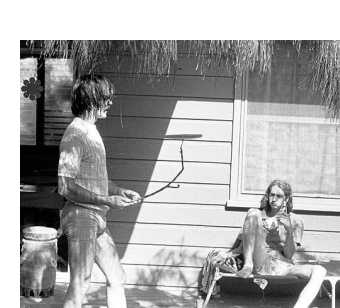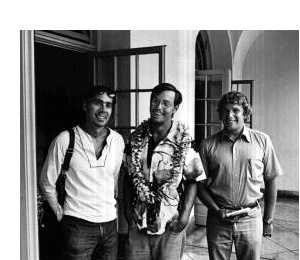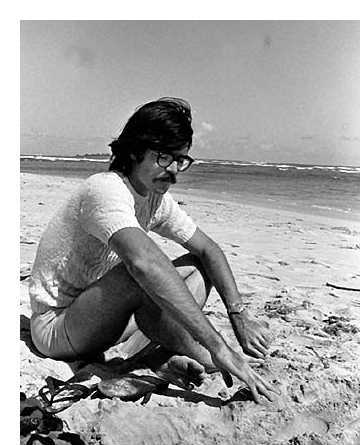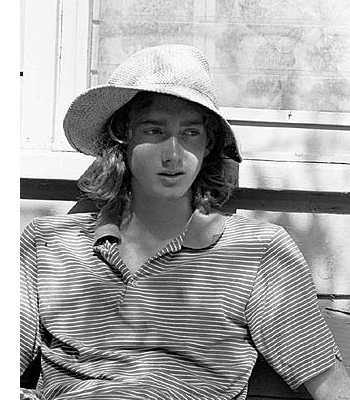| back to "My Hidden History" | home | |
| co-chairpeople Party history archives/documents a critique | ||
|
The quality of any organization rests with its people. Though it was always small, the audacity, courage and creativity of Jeff Blair and Dexter Cate insured that the People's Party of Hawaii was always far mightier than its miniscule size or budget. 
I had the good fortune of spending many memorable hours with Jeff and Dexter, and it only seems fair to report that they remain heroes to me. It is difficult to summarize the unshakable courage of their convictions, their fearlessness in standing alone against much greater powers and numbers, and the great reach of their interests and accomplishments. Their friends understand why I honor and revere them, but for everyone else, allow me a few anecdotes about my fellow co-chairpersons, a.k.a. "The Triumvrate." (Their People's Party exploits are detailed in the accompanying pages). Party members Ken Ellingwood and Tony Hodges also deserve accolades, which I will add as information comes my way. My efforts to contact them have to date been fruitless. Any leads would be greatly appreciated.
Two-thirds of the Party braintrust: Dexter (left) and
me (right); Laie, 1974. Jeff must have had to work. photo courtesy of Ian Lind I would like to end this introduction with a few words on our collective belief in the electoral political process. Although I cannot recall any specific discussions on this issue, I don't think any of us believed that getting a few people elected under the aegis of the People's Party would trigger meaningful political change. But while many of our friends dismissed the electoral process as worthless, I thik we generally viewed it as an enormous opportunity to raise certain issues with a public that was fundamentally passive and uninvolved (and I would say, remains so). I think we viewed the People's Party of Hawaii and the election process as a bully pulpit; if you had a gift for political theater, then elections offered a rare opportunity for media coverage of critical issues. I happened to be with Jeff when he was arrested by the F.B.I. for violating the Selective Service Act, to wit, burning his draft card and various other subversions. He was training me to be a draft counselor (a more or less hopeless cause) and as part of that training he'd taken me to the Windward Oahu Draft Board office to do some research. This was in hindsight a foolhardy tempting of the Fates, since Jeff was known to the staff and anyone who'd seen his "Look how brightly this flimsy card burns" photo in the Honolulu newspapers. 
Naturally enough I was scared witless by the sudden arrival of the unsmiling men in dark blue suits, but Jeff seemed cool throughout the ordeal, giving me instructions on who to call as if it were a routine experience to be handcuffed and hauled off to Federal prison for political crimes carrying a five-year sentence. I was 19 and he was 21. I subsequently visited Jeff in Halawa Jail--a sobering experience-- and accompanied him on one of his many visits to the library as he prepared to defend himself in Federal Court. Despite a robust and dramatic defense--how many 21-year olds have you seen stand up in the august quiet of a Federal Court to defend themselves against felony charges?--Jeff lost the case.
Jeff (center) and Jim Albertini (right) circa 1972
photo courtesy of Ian Lind A jury found him guilty, of course--case law had long ago exhausted all possible defenses to such charges--but Judge Pence accompanied his sentence of $250 fine for each of the two destroyed draft cards with a most extraordinary statement which I paraphrase: "This is the sort of young man society need free, not behind bars." A remarkable jurist, Martin Pence, and remarkably insightful in this case. But even that sentence didn't hold. As Jeff reported to me in a recent email: "On appeal the conviction was reversed. The Ninth Circuit Court of Appeals agreed with us that the cards had not been distroyed and berated the prosecutors for not charging me instead with non-possession (also a 5-year felony). The prosecutors decided not to appeal to the Supreme Court and not to restart prosecution from square one." I don't recall being recruited to the People's Party by Jeff, though he must have done so; I suspect I leaped at the chance so naturally that I've forgotten his pitch. It must have included something about shaking the foundations of capitalism and a return to democracy--or perhaps it was just the prospect of devilishly good political fun with such good company. Jeff is the one who actually turned what was at that point a legal shell of a political party into a party with candidates and active members (albeit some zany ones). Dexter was a genius at political theater. His campaigns always brimmed with dramatic or witty actions and ideas which inevitably drew outsized attention to the causes he promoted. In one AFSC committee meeting, the group was brainstorming anti-nuke ideas. Dexter suggested assembling a Zodiac or two and running them out to challenge Navy ships at Pearl Harbor. This idea made me swallow hard (wouldn't we get arrested? Or swamped?), but I had no doubt that Dexter could organize and lead such an action to completion. 
The idea highlights Dexter's knack for encapsulating a position within a media-savvy action. Among many examples, one of my favorites was his plank that the People's Party of Hawaii would accept no donation larger than the cost of a case of beer (about $10 at the time). This brilliantly spotlighted the issue of campaign contributions in a concrete image every voter could instantly grasp. The leaky bathroom faucet at Dexter and Susie's World War II-era Quonset Hut home had an explanatory card taped above it: "five drops of water per minute equals three gallons per week equals 150 gallons per year." I've forgotten the exact calculation, but it was indicative of their awareness of natural resources and wry wit. The quonset hut's landlord, as I recall, did nothing to keep the place up; I once helped Dexter patch the roof with the aid of some haole koa branches and latex sealant. Dexter had lost a pile of expensive books to a roof leak, and his complaint had unleashed an immediate eviction notice.
Dexter at Laie, Oahu 1974
photo courtesy of Ian Lind
The eviction went nowhere, of course, and their quonset hut remained the place to go for an amazing range of fascinating stuff: discussions of philosophy, listening to recordings of whale calls, and of course a cold beer to enhance the discussion. Despite a fulltime public school teaching gig, Dexter engaged in a whirlwind of activism. As members of the AFSC (American Friends Service Committee), we'd agreed to put together a Peace Committee newsletter. Dexter sat down and designed an astonishing logo of a gun transforming into a flower (my idea for a wave being rightly rejected as too tsunami-like). Design was just another of his talents. (Of course we wrote the newsletter and got it mailed as well; such is the inglorious nitty-gritty of activism.) We traveled together to the Big island to promote the Party (we were the epitome of two long-haired hippies wearing headbands, if I recall the photo in the Hilo newspaper) and examine the hillside foundation of the family home there. I met his brother, a jewelry/gold craftsman, who made wedding rings for Teresa and I. I am deeply saddened by Dexter's untimely death, and by my losing touch with him once I moved from Oahu. I hope these memories will keep his heroism, dedication and the great sense of fun he brought to activism alive. Dexter's commitment to cetacea and dolphins led him to undertake a harrowing single-handed rescue of dolphins herded for slaughter in the storm-tossed waters off a remote Japanese island. This is a participant's eye-witness account. Howard Hall's account ends with this fitting paragraph: "The news release in International Wildlife magazine said that Dexter Cate had drowned while ascending from a deep free dive in the waters near Hawaii. I wondered if he had been looking for dolphins. I wondered if, had the dolphins found him, they would have tried to save him as they have saved drowning humans many times in the historical past. Certainly, from the dolphins' point of view, he was a human worth saving much more than most." Greenpeace Foundation links to the campaign to stop dolphin kills and Dexter's role in it: story one story two Greenpeace Hawaii history Among his many other accomplishments, Dexter founded Greenpeace-Hawaii. |
||
 I deeply regret not making more of an effort to maintain organized archives of the Party.
As a result of my various moves and general disorder, I have only a scattering of documents and
associated memories. By way of excuse, let me note my level of
activity during 1974-75: fulltime student at UH earning 3.5 GPA, working half to
three-quarter time at Island Trends as general laborer and carpenter's helper,
serving on the Executive Committee and subcommittees at AFSC, as well as the usual young adult stuff:
a full romance, playing guitar with my friends, going to the beach, hiking the Koolaus,
tuning up my cantankerous 1968 VW Beetle, and downing the occasional beer (in no particular order).
I deeply regret not making more of an effort to maintain organized archives of the Party.
As a result of my various moves and general disorder, I have only a scattering of documents and
associated memories. By way of excuse, let me note my level of
activity during 1974-75: fulltime student at UH earning 3.5 GPA, working half to
three-quarter time at Island Trends as general laborer and carpenter's helper,
serving on the Executive Committee and subcommittees at AFSC, as well as the usual young adult stuff:
a full romance, playing guitar with my friends, going to the beach, hiking the Koolaus,
tuning up my cantankerous 1968 VW Beetle, and downing the occasional beer (in no particular order).
Or maybe I just have a lousy memory. In any event, all those dozens of meetings have blurred together. For a more coherent account of the Party's history, please read Jeff's pages. The following semi-random vignettes will hopefully give the reader the flavor of the participants and actions of the Party.
Me at 20: AFSC weekend retreat, Laie, Oahu 1974
photo courtesy of Ian Lind |
||
|
The source documents are posted as JPGs with brief commentaries. Party Meeting 9-74 The "Black Plastic Bag of Cash" Caper The Party's 1976 Convention Registry The National Party's 1976 Ticket Party article Star-Bulletin 10-28-76 Party meeting 5-28-76 June 1976 agenda notes Party Meeting 8-24-76 Plan of Action 12-5-76 My testimony on the death penalty Correspondence from Jeff 11-75 Correspondence from Jeff May-76 Correspondence from Jeff 5-76 Dexter's brochure 1976 Campaign PPH brochure 1976 Campaign From the distance of almost 30 years, it's difficult to recall the limitations imposed by the day-to-day grind of our lives--work, grocery shopping, AFSC and other community meetings, not to mention having a garden and a personal life--and the political climate of the early to mid-70s. Still, a few points can be made: In a sense, none of the Party leaders had any interest in being a leader. As a result, the leadership was both invisible and practical. I don't recall giving "leadership" a single thought; it was present when needed and so natural that no one even noticed it. Our single concession to "leadership" was our running joke about Dexter, Jeff and I being the Triumvrate. It would be wonderful if this quality could be institutionalized, but I doubt that it can. What can be institutionalized is the political sclerosis which has gripped Hawaii for the past 30 years.
|